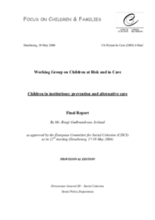In this report an attempt is made to address the issues that were defined in the terms of reference of the Working Group on Children at Risk and in Care.
The report starts with a discussion on the effect of institutionalisation on children and society at large. This is followed by an overview of the situation in Europe in terms of placement of children in residential care. Three distinct categories are identified: states with high rate of child residential care coupled with large institutions (Central and Eastern Europe); states with low rate of residential care and large institutions (South Eastern Europe); finally states where the process of de-institutionalisation, prevention and alternative care has already taken place, albeit in varying degree (more affluent European states).
The relationship between out-of-home placement of children and family support is addressed specifically. It is argued that there is a strong correlation between the two and the lack of a coherent family policy and fragmented services for families may lead to unnecessary placements. This is followed by an examination of different approaches in child protection systems among European states, which have important consequences for vulnerable children and families.
The report identifies several "best practices" in preventive strategies and programmes that have proofed to be effective among European states in relation to placement of children. It is argued that these practices conform to the best interest of the child in a more effective way than traditional methods.
Alternative care to large institutions is discussed, reforms in residential care and family-types of care. A special focus is given to foster care and competence building to meet different needs of children at risk and in care.
The importance of post-care support for children leaving care has been underestimated. The report highlights some of the issues that should be addressed.
Finally, some remarks are made on the role of the social worker in the process of child placement, which may have crucial impact on children and families.
The Council of Europe web site can be accessed by clicking here.
©Council of Europe

